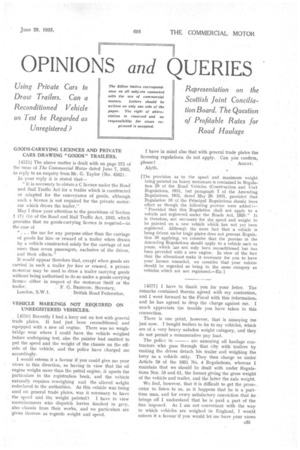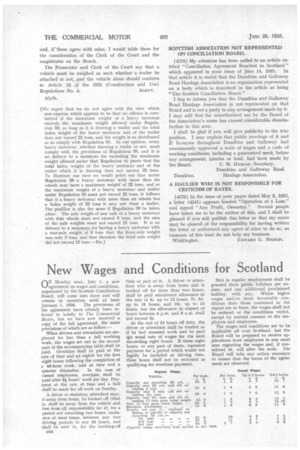OPINIONS and QUERIES
Page 103

Page 104

If you've noticed an error in this article please click here to report it so we can fix it.
Using Private Cars to Draw Trailers. Can a Reconditioned Vehicle on Test be Regarded as Unregistered ? Representation on the Scottish Joint Conciliation Board, The Question of Profitable Rates for Road Haulage
GOODS-CARRYING LICENCES AND PRIVATE CARS DRAWING "GOODS" TRAILERS.
[4575] The above matter is dealt with on page 571 of the issue of Tim Commercial Motor dated June 7, 19.35, in reply to an enquiry from Mr. G. Taylor (No. 4562).
In your reply it is stated that
" It is necessary to obtain a C licence under the Road and Rail Traffic Act for a trailer which is constructed or adapted for the conveyance of goods, although such a licence is not required for the private motorcar which draws the trailer."
May I draw your attention to the provisions of Section 1 (7) (b) of the Road and Rail Traffic Act, 1933, which provides that no goods-carrying licence is required—in the case of
.• . the use for any purpose other than the carriage of goods for hire or reward of a trailer when drawn by a vehicle constructed solely for the carriage of not more than seven passengers, exclusive of the driver, and their effects," It would appear therefore that, except when goods are carried in such a trailer for hire or reward, a private motorcar may be used to draw a trailer carrying goods without being authorized to do so under a goods-carrying licence either in respect of the motorcar itself or the trailer. . F. G. BRISTOW, Secretary, London, S.W.1. British Road Federation.
VEHICLE MARKINGS NOT REQUIRED ON UNREGISTERED VEHICLES.
[45761 Recently I had a lorry out on test with general trade plates. It had just been reconditioned and equipped with a new oil engine. There was no weighbridge near where I could have the vehicle weighed before undergoing test, also the painter had omitted to put the speed and the weight of the chassis on the offside of the vehicle, and the police have charged me accordingly.
I would esteem it a favour if you could give me your views in this direction, as having in view that the oil engine weighs more than the petrol engine, it upsets the particulars in the registration book, and the vehicle naturally requires reweighing and the altered weight redeelared to the authorities. As this vehicle was being used on general trade plates, was it necessary to have the speed and the weight painted? I have in view manufacturers who dispatch lorries finished in grey, also chassis from their works, and no particulars are given thereon as regards weight and speed.
I have in mind also that with general trade plates the licensing regulations do not apply. Can you confirm, please? AGENT. Alyth.
[The provision as to the speed and maximum weight being painted on heavy motorcars is contained in Regulation 28 of the Road Vehicles (Construction. and Use) Regulations, 1931, but paragraph 7 of the Amending Regulations, 1931, dated May 29. 1931, provided that Regulation 38 of the Principal Regulations should have effect as though the following proviso were added :— "Provided that this Regulation shall not apply to a vehicle not registered under the Roads Act, 1920." It is therefore, not necessary for the speed and weight to be painted on a new vehicle which has not yet been registered. Although the mere fact that a vehicle is being driven unie,r tra4e plates does not prevent Regulation 38 applying, we consider that the proviso in the Amending Regulations should apply to a vehicle such as yours, which has not only been reconditioned but has been provided with a new engine. In view of the fact that the alteration §: make it necessary for you to have your licence amended, we consider that your vehicle should be regarded as being in the same category as vehicles which are not registered.—ED.1 [4577] I have to thank you for your letter. The remarks contained therein agreed with my contention, and I went forward to the Fiscal with this information, and he has agreed to drop the charge against me. I much appreciate the trouble you have taken in this connection.
There is one point, however, that is annoying me just now. I bought trailers to fix to my vehicles, which are of a very heavy unladen weight category, and they do not permit a remunerative pay load.
• The police in are annoying all haulage contractors. who pass through that city with trailers by making the driver detach his trailer and weighing the lorry as a vehicle only. They then charge us under Article 59 of the 1931 No. 4 Regulations, whereas I maintain that we should be dealt with under Regulations Nos. 58 and 61, the former giving the gross weight of the vehicle and trailer, and the latter the axle weight. We find, however, that it is difficult to get the prosecutor to listen to us, as it happens that he is a parttime man, and for every satisfactory conviction that he brings off I understand that he is paid a part of the fine imposed. As I am not conversant with the way in which vehicles are weighed in England, I would esteem it a favour if you would let me have your views c53 and, if' these agree with mine, I would table these for the consideration of the Clerk of the Court and the magistrates on the Bench.
The Prosecutor and Clerk of the Court say that a vehicle must be weighed as such whether a trailer be attached or not, and the vehicle alone should conform to Article 59 _of the 1931 (Construction and Use)
Regulations No. 4. AGENT. Alyth.
[We regret that we do not agree with the view which you express, which appears to be that no offence is committed if the maximum weight of a heavy motorcar exceeds the maximum weight allowed under Regulation 59, so long as it is drawing a trailer and the total laden weight of the heavy motorcar and of the trailer does not exceed 22 tons, and the weight is so distributed as to comply with Regulation 61. In our opinion, every heavy motorcar, whether drawing a trailer or not, must comply with the provisions of Regulation 59, and it is no defeine to a summons for exceeding the maximum weight allowed under that Regulation to prove that the total laden weight of the heavy motorcar and of the trailer which it is drawing does not exceed 22 tons. Toillustrate our vieW we would point out that under Regulation 59 a heavy motorcar with more than six wheels may have a maximum weight of 22 tons, and as the maximum weight of a heavy motorcar and trailer under Regulation 58 must not exceed 22 tons, it follows that if a heavy motorcar with more than six wheels has a laden weight of 22 tons it may not draw a trailer. The posifion is also the same if Regulation 59 be taken ,alone. The axle weight of any axle of a heavy motorcar with fciiir wheels must not exceed 8 tons, and the sum of the axle weights Must not exceed 12 tons. It is no defence to a summons for having a heavy motorcar with a rear-axle weight of 9 tons that the front-axle weight was only 3 tons, and that therefore the total axle weight did not exceed 12 tons.—ED.]
SCOTTISH ASSOCIATION NOT REPRESENTED ON CONCILIATION BOARD.
145781 My attention has been called to an article entitled "Conciliation Agreement Reached in Scotland" which appeared in your issue of June 14, 1935. In that article it is stated that the Dumfries and Galloway Road Haulage Association is an organization represented on a body which is described in the article as being "The Scottish Conciliation Board."
I beg to inform you that the Dumfries and Galloway Road Haulage Association is not represented on that Board and is not .a party to any arrangement made by it. I may add that the unauthorized use by the Board of the Association's name has caused considerable dissatisfaction in this area.
I shall be glad if you will give publicity to the true position. I may explain that public meetings of A and B licencees throughout Dumfries and Galloway had unanimously approved a scale of wages and a code of working conditions, including a guaranteed week, before any arrangement, interim or final, had been made by
the Board. C. M. HYSLOP, Secretary, Dumfries and Galloway Road Dumfries. Haulage Association.
A HAULIER WHO IS NOT RESPONSIBLE FOR CRITICISM OF RATES.
[4579J In the issue of your paper dated May 3, 1935, a letter (4541) appears headed "Operation at a Loss" and signed "Any Profit, Oswestry." Several people have taken me to be the author of this, and I shall be pleased if you will publish this letter so that my name may be cleared of the responsibility for having written the letter or authorized any agent of mine to do so, as rumours of this kind do not help my business.
Whittington. EDWARD G. BISHOP.




























































































































































